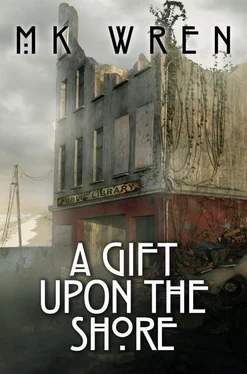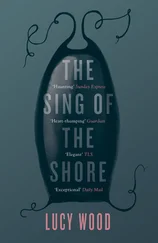My knife slips, missing my finger only by good luck.
Yes, it all sounds so calculating, like breeding livestock, but these people grew up with that kind of calculation. And in fact, Jerry does love both Miriam and Esther, but in the same sense that he loves the children, he loves the crones, he loves me. He doesn’t know what it means to be in love, but he loves, deeply and steadfastly.
And Miriam? If what she feels for Jerry can be termed love, it is a jealous love, as her god is a jealous god. No doubt she feels maternal love for her children. Or is that possessiveness? Or am I coloring her with my fear? All I know is that she seldom laughs, and I’ve never seen her weep.
I fear that absence of laughter and tears. It doesn’t indicate a lack of passion, but rather the opposite: a passion that is too volatile for its vessel.
By the time Miriam and Jerry reach the top of the beach path, I’ve filled the basket. I rise, grunting at the aching stiffness that occupied my knees while I sat. Jerry waves at me, strides across the grass, while Miriam approaches more slowly, watching Jerry, watching me.
I see Luke in Jerry always. He’s tall and thin like his father, but that thinness is deceptive. He is all muscle, flat and hard, his hands strong and armored with calluses. Shadow runs to him, and Jerry feints playfully with her until he has her galloping in wild circles, then he calms her with a few words. When he reaches the deck, he offers me an ebullient, “Good day, Mary!”
“Good day to you, Jeremiah. It looks like you and Miriam had good luck in the tide pools. Good day, Miriam.”
She smiles, although it doesn’t reach her eyes, but before she can speak, Jerry says, “Miriam, you’d better go take care of the mussels.”
That rudeness is typical and particularly annoying because he is always blithely unaware of it. I see resentment congeal in Miriam’s eyes, but it isn’t directed at Jerry. I get the brunt of it, deep and laced with jealousy. She picks up his bucket and hers, mounts the deck steps, but at the door pauses to say, “Jeremiah, we need some wood split for the stove.”
I restrain a smile. She’s restoring the real chain of command as it pertains to household tasks. Such things are her domain.
But Jerry only nods. He doesn’t recognize the subtle reprimand in that reminder. When the door closes behind Miriam, he says, “Mary, we saw some whale spouts today.”
That’s something else I’ve lost with my failing sight: the brief puffs of mist that mark the passage of the gray whales on their migrations from Alaska to Baja in the spring and back again in the fall.
“Did you? Well, that’s always reassuring.”
“Yes, I guess it is, but I keep hoping one of them will get beached close by where we can get at it. I know how much you love them, but we could use the oil.”
I laugh at that, then lean down to pick up the basket of kelp. “I’d better get this to the compost.”
“No, Mary, I’ll take it,” he insists, reaching for the basket.
But I refuse to relinquish it. “Jerry, I’m quite capable of carrying it. I may be slow, but—”
“You can’t carry it with your cane.”
“I can walk without my cane if I’m careful.”
He smiles, placating now. “I know, but I’m going out to the garden anyway.”
With a sigh I surrender to his kindness. Besides, Stephen is coming around the corner of the house with Isaac tagging along behind him. “All right, Jerry. Thanks.”
He departs, pausing on his way to talk to the boys, and I go into the house to wash the kelp slick off my hands. When I return, I find Stephen occupying one of the chairs, while Isaac sits cross-legged on the deck beside Shadow, and she patiently tolerates his unintentionally rough petting. Stephen watches him with the protective eye of an older brother, although Isaac is not his brother. Not genetically.
Stephen looks up at me. “Isaac isn’t feeling good today. Bernadette said he shouldn’t work in the garden. Is it all right if he stays with us?”
Isaac grins at me, blue eyes clear as the sky, his copper red hair shining in the sunlight. Freckles are powdered dark against his pale skin, and he is too thin, too small for his ten years. He constantly coughs and wheezes and doesn’t seem to notice it, nor does he seem to notice the malformed foot that makes him limp when he walks, stumble when he runs. He is Miriam’s child by an Arkite, and she’s the only one here who doesn’t dote on him.
Miriam mistrusts imperfection. Perhaps she fears it. But she probably won’t have to deal with it much longer in the form of her asthmatic, crippled son. He won’t survive another winter if it brings another onslaught of pneumonia.
She calls him god-marked.
I lean down and press my hand to Isaac’s forehead. It seems cool, rather than hot with fever. He says, “I’m all right now, Mary. Bernadette gave me some tea.”
“Well, if she says you’re not to work, you won’t. Not today.” I go to the chair next to Stephen’s, reach for the diary in my pocket. “Isaac, did Stephen tell you what we’ve been doing?”
He shakes his head, and Stephen answers, “No, I didn’t tell him. I haven’t told anybody.”
I’m a little surprised at that. And a little relieved.
I nod without comment. “Stephen and I have been studying some history, Isaac. Mine and Rachel’s.”
“Is that history?”
“On a smaller scale, it’s as much history as the fall of the Roman Empire.”
“But that was a long time ago.”
Stephen puts in quietly, “Just listen, Isaac. Don’t argue with Mary.”
Isaac draws his knees up, wraps his arms around them, and looks up at me expectantly. I open the diary. It’s more a prop for me than a necessity. I read it last night, polished each shard of memory. “All right, Stephen, where were we?”
“When Rachel asked you to stay at Amarna. But you didn’t give her an answer then.”
“No. I couldn’t. I think I knew my answer, but I had to wait until I felt stronger physically and emotionally. A week later I wrote to my boss at IDA. She telephoned me within a few days and offered me a promotion if I’d come back to Portland.” I laugh, remembering that small, but vital triumph. “That’s when I told Rachel I’d like to stay, to make Amarna my home. And then…” I turn a page. “Then spring came to Amarna.”
Isaac objects, “Spring always comes to Amarna.”
“I remember a winter when we weren’t sure of that. But my first spring at Amarna was a revelation. I discovered what seasons meant. You two don’t know what it’s like to live in a city where changing seasons really don’t mean anything. Here I watched trees flower and leaf, daffodils bloom, and cow parsnips unfold those huge, soft leaves, their stalks reaching up—well, they were higher than my head by summer. And horsetails. You know them, Isaac. They look like green bottle brushes.”
Stephen nods and says, “ Equisetum .”
Isaac wrinkles his nose. “What does that mean?”
“That’s their proper name,” Stephen explains.
And I add—ever the teacher; I can’t seem to help myself: “They’re descendants of a plant called calamites that lived about three hundred million years ago and grew to be thirty feet high.”
Isaac’s eyes widen. “Was there dinosaurs then?” But as soon as the question is out, he looks apprehensively toward the house as if he’s afraid someone might hear him. His mother, no doubt.
“No, Isaac, there were no dinosaurs yet. Anyway, in that first spring I learned about farming—preparing the soil, planting the seeds, watching them grow, and all the while battling weeds and moles and bugs and slugs. I saw a litter of rabbits and a kid born. I saw chicks hatch. That was a new project of Rachel’s that year, raising chickens from scratch, so to speak. I learned to extract honey from the combs—no, that was later, in the summer. I learned about fishing and mussel collecting and clam digging from Jim Acres. I learned folk songs from Connie. She’d play her guitar and sing harmony to my lead. From Rachel I learned about the sea. She showed me the way wind and current and tide work together, the patterns of the sand, the creatures that leave their tracks on it. She called it calligraphy, and every animal has its own signature. She showed me the birds that call the sea home, the plants and animals that live in the tide pools. I even did some writing—Jim loaned me his old word processor—and I sold a few articles. And I saw quite a lot of Captain Harry Berden. Yes, that was the most beautiful spring of my life. But old people always say that about the springtimes of their youth, don’t they, Isaac?”
Читать дальше












